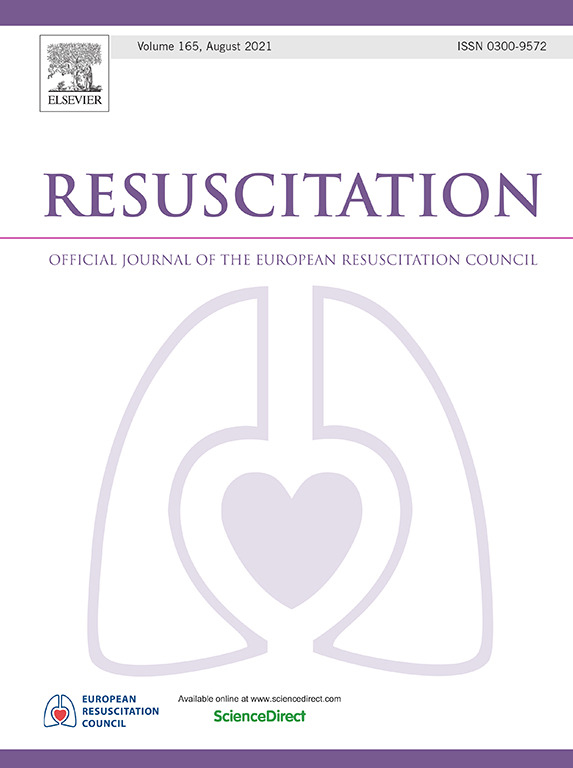Impact of sedation depth on neurological outcome in post-cardiac arrest patients – A retrospective cohort study
IF 6.5
1区 医学
Q1 CRITICAL CARE MEDICINE
引用次数: 0
Abstract
Aims
Whether targeted temperature management (TTM) might improve neurologic prognosis in patients after cardiac arrest is currently under debate. Data concerning sedation depth during TTM is rare. This study aimed to compare the impact of different sedation depths on neurological outcomes in post-cardiac arrest patients undergoing TTM.
Methods
In this retrospective, before-and-after registry study, all patients receiving TTM on a medical ICU between 08/2016 and 03/2021 were included. This study evaluated the following sedation targets: RASS-target during TTM −5 until 08/2019 and RASS-target −4 since 09/2019. The primary endpoint was favorable neurological outcome at ICU discharge, defined as a Cerebral Performance Category (CPC) score of 1 or 2.
Results
403 patients were included (RASS-target −5: N = 285; RASS-target −4: N = 118). Favorable neurological outcome was documented in 54/118 (45.8 %) patients in the group with a RASS-target of −4 compared to 111/285 (38.9 %) in the group with a RASS-target of −5. After adjustment for age, sex, initial shockable rhythm, bystander CPR, duration of CPR and mean arterial pressure 12 h after CPR, favorable neurological outcome was associated with RASS-target −4 (OR 1.82 (95 % CI: 1.02–3.23); p = 0.042). ICU survival was similar in both groups while 30-day survival was associated with RASS-target −4 (OR 1.81 (1.01–3.26); p = 0.047).
Conclusion
Lighter sedation strategies during TTM after cardiac arrest might improve outcome and should be further investigated.

镇静深度对心脏骤停后患者神经系统预后的影响——一项回顾性队列研究。
目的:靶向温度管理(TTM)是否可以改善心脏骤停后患者的神经系统预后目前仍存在争议。关于TTM期间镇静深度的数据很少。本研究旨在比较不同镇静深度对心脏骤停后接受TTM患者神经系统预后的影响。方法:在这项回顾性、前后注册研究中,纳入了2016年8月至2021年3月期间在ICU接受TTM的所有患者。本研究评估了以下镇静靶点:TTM -5至2019年8月期间的ras -target和2019年9月以来的ras -target -4。主要终点是ICU出院时良好的神经系统预后,定义为脑功能分类(CPC)评分为1或2。结果:纳入403例患者(ras -target -5: N = 285;ras -target -4: N = 118)。在rass靶点为-4的组中,54/118(45.8 %)患者的神经系统预后良好,而在rass靶点为-5的组中,111/285(38.9 %)患者的神经系统预后良好。在调整了年龄、性别、初始休克节律、旁观者CPR、CPR持续时间和CPR后平均动脉压12 h后,良好的神经预后与ras -target -4 (OR 1.82(95 % CI: 1.02-3.23)相关; = 0.042页)。两组ICU生存率相似,30天生存率与ras -target -4相关(OR 1.81 (1.01-3.26); = 0.047页)。结论:心搏停止后TTM中较轻的镇静策略可能改善预后,值得进一步研究。
本文章由计算机程序翻译,如有差异,请以英文原文为准。
求助全文
约1分钟内获得全文
求助全文
来源期刊

Resuscitation
医学-急救医学
CiteScore
12.00
自引率
18.50%
发文量
556
审稿时长
21 days
期刊介绍:
Resuscitation is a monthly international and interdisciplinary medical journal. The papers published deal with the aetiology, pathophysiology and prevention of cardiac arrest, resuscitation training, clinical resuscitation, and experimental resuscitation research, although papers relating to animal studies will be published only if they are of exceptional interest and related directly to clinical cardiopulmonary resuscitation. Papers relating to trauma are published occasionally but the majority of these concern traumatic cardiac arrest.
 求助内容:
求助内容: 应助结果提醒方式:
应助结果提醒方式:


